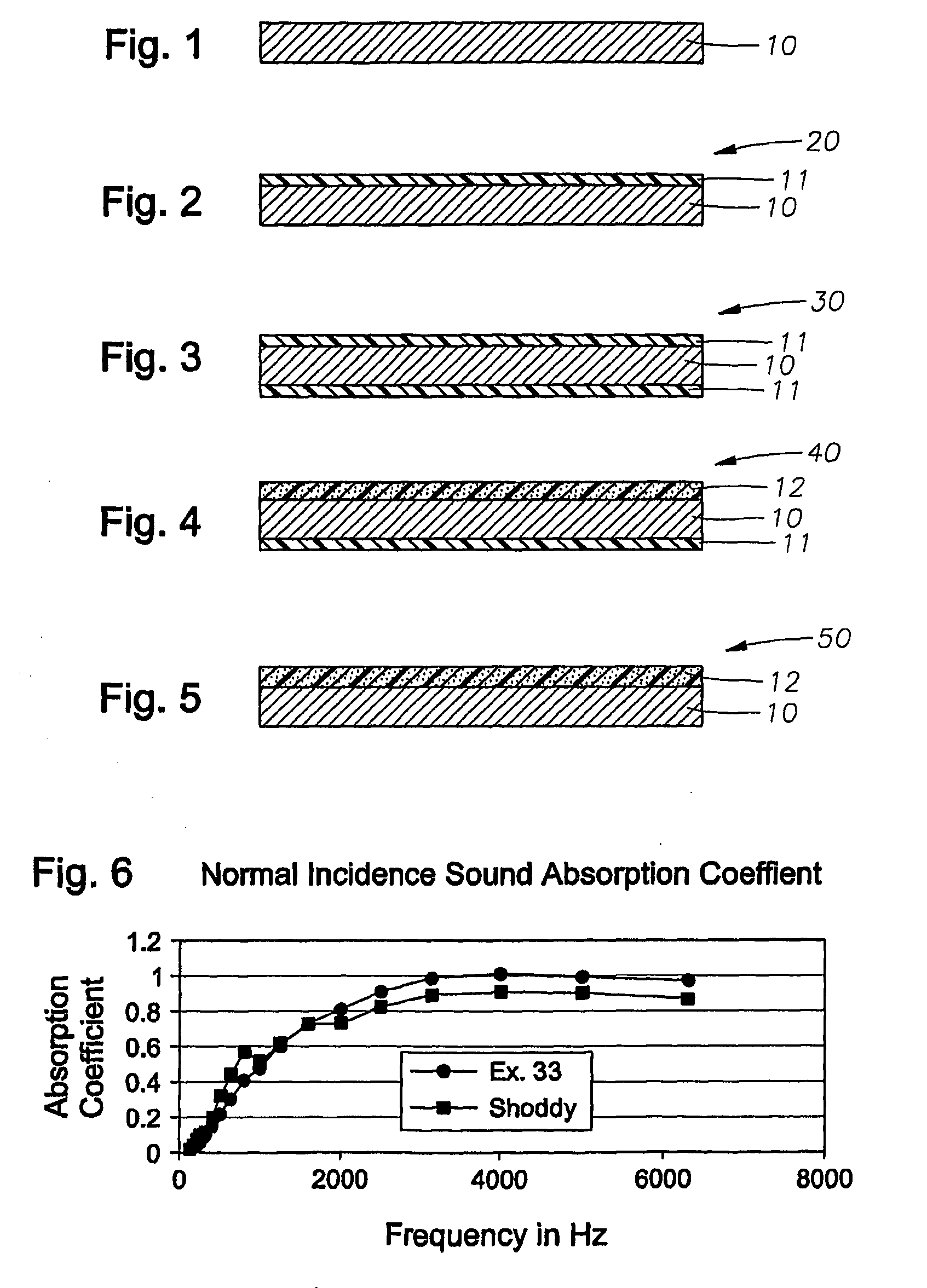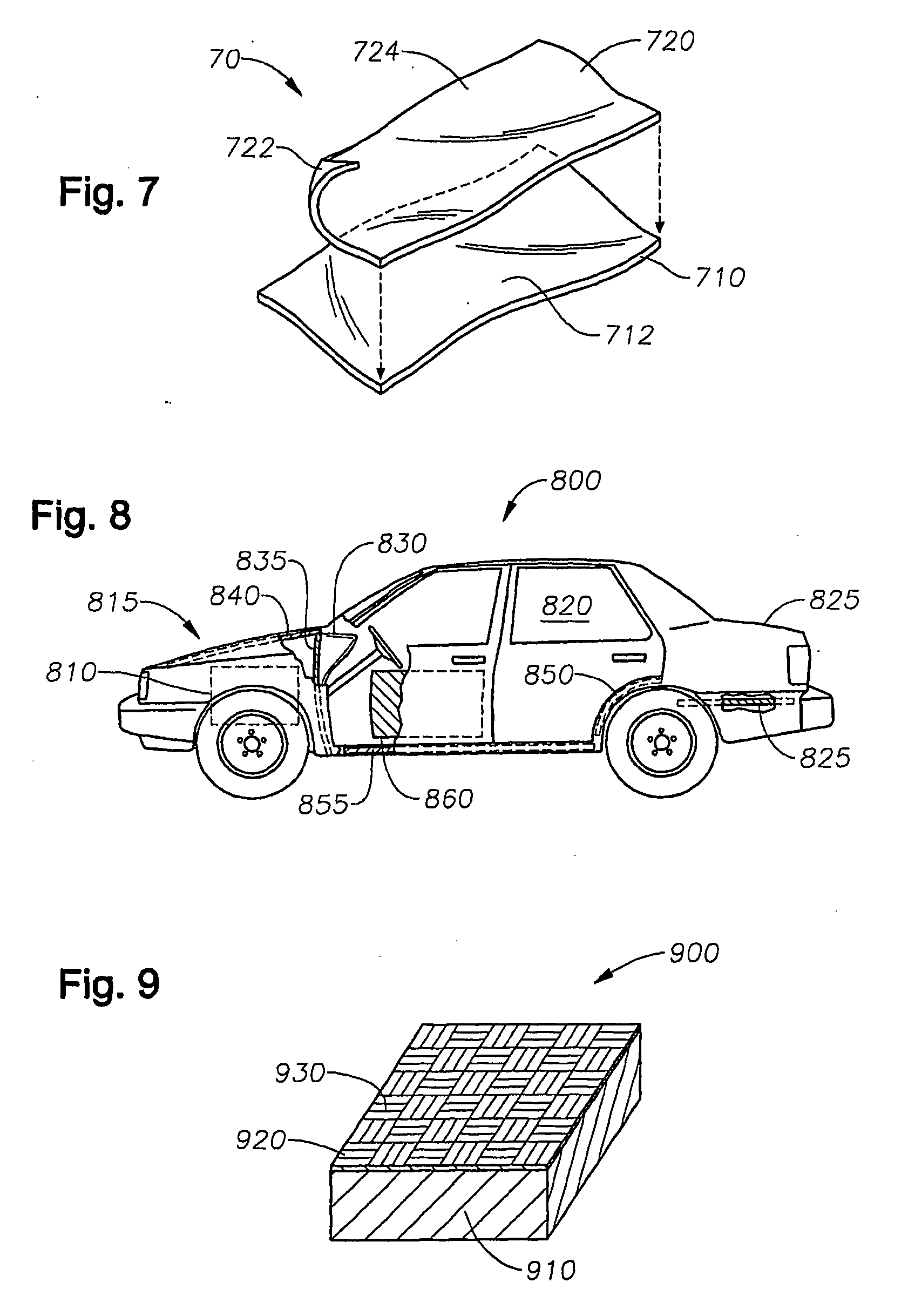Nonwoven material for acoustic insulation, and process for manufacture
- Summary
- Abstract
- Description
- Claims
- Application Information
AI Technical Summary
Benefits of technology
Problems solved by technology
Method used
Image
Examples
example 42
Deep Draw Moldability
[0229]An airlaid product was placed into a mold to demonstrate moldability of a nonwoven material. A circular aluminum mold was machined. The 152.4 mm (6.0 in) circular aluminum mold top has a 69.85 mm (2.75 in) circular projection tapering over (0.875 in) to a diameter of 50.8 mm (2.0 in). The aluminum mold base is machined out to a depth of 25.4 mm (1.0 in) and has an initial diameter of 76.2 mm (3.0 in) tapering to 57.15 mm (2.25 in) at the bottom. All edges contacting the insulation material are rounded to a radius of 3.2 mm (0.125 in).
[0230]Deep-draw moldability of the airlaid insulation material of this invention was demonstrated by taking a 22 cm×30 cm piece of the 750 gsm pilot plant sample of 30 / 70 bico / fluff airlaid similar to that of Example 28, but which had been to 18.4 mm caliper, heating it in a convection oven set at 150° C. for 5 minutes, and then quickly placing it on a cold (ambient) milled aluminum die base. The die top was positioned and a p...
example 43
Fire Retardant Treated Airlaid Insulation Material
[0231]The laboratory handsheet apparatus was used to produce a 250 gsm airlaid pad which was 13 mm thick. The fiber composition used was 70 percent FOLEY FLUFFS® and 30 percent Trevira type T-255 number 1661 bicomponent binder fiber. To cure the bicomponent fiber, the pad was placed in a 150° C. convection oven for 15 minutes. The pad was cut into three samples 10.2×35.5 cm (4×14 inches). Each test strip was sprayed on each side with a 40 percent solids solution of fire retardant additive SPARTAN™ AR 295, a diammonium phosphate based flame retardant from Spartan Flame Retardants, Inc. of Crystal Lake, Ill. to a wet add-on of 5-10 gsm and placed in the 150° C. convection oven for a drying time of 1.0 minute. When tested for horizontal burning under the conditions of FMVSS-302, the samples burned for 50 seconds before self-extinguishing and the flame front traveled 64 mm (2.5 inches). To pass the horizontal burn test, the maximum burn ...
example 44
Fire Retardant and Binder Treated Airlaid Insulation Material
[0233]The laboratory handsheet apparatus was used to produce a 200 gsm airlaid pad which was 13 mm thick. The fiber composition used was 70 percent FOLEY FLUFFS® and 30 percent Trevira type T-255 number 1661 bicomponent binder fiber. The uncured 35.5 cm square pad (14 inch×14 inch) was placed over a vacuum box, and a 50 / 50 mixture of Fire Retardant, SPARTAN AR295 at 25 percent solids, and Latex Binder, AirFlex 192 at 24.8 percent solids, was sprayed onto one surface of the structure. The chemical add-on was 5.3 grams wet solution. (approximately 10 gsm dry add on). The pad was cured at 150° C. for 15 minutes.
[0234]A 12-mesh screen, 50 mm wide×300 mm long was placed over the non-chemically treated top surface of the sample as a flame arrestor. Then, when tested for horizontal burning under the conditions of FMVSS-302, the sample burned for 30 seconds before self-extinguishing and the flame front traveled 38 mm (1.5 inches)....
PUM
| Property | Measurement | Unit |
|---|---|---|
| Length | aaaaa | aaaaa |
| Length | aaaaa | aaaaa |
| Percent by mass | aaaaa | aaaaa |
Abstract
Description
Claims
Application Information
 Login to View More
Login to View More - R&D
- Intellectual Property
- Life Sciences
- Materials
- Tech Scout
- Unparalleled Data Quality
- Higher Quality Content
- 60% Fewer Hallucinations
Browse by: Latest US Patents, China's latest patents, Technical Efficacy Thesaurus, Application Domain, Technology Topic, Popular Technical Reports.
© 2025 PatSnap. All rights reserved.Legal|Privacy policy|Modern Slavery Act Transparency Statement|Sitemap|About US| Contact US: help@patsnap.com



